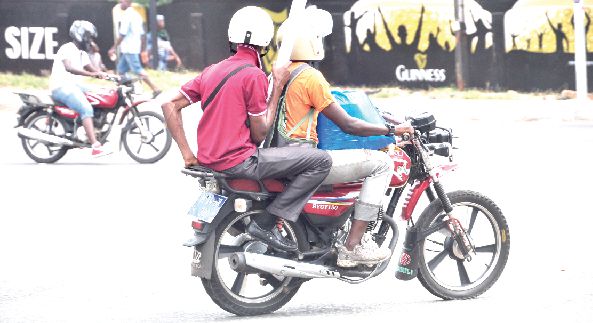There has been a decline in the government-owned transport system and an increasing number of private vehicles resulting in more congestion in urban centres. For the past ten years in Ghana, motorcycle usage for commercial purposes has shot up so high, and is popularly referred to as “Okada”. The government and the citizenry have been left to wonder if the surge in this alternative means of transport is a blessing or a menace by all standards.
In a 2017 study by a senior lecturer of the Kwame Nkrumah University of Science and Technology (KNUST), Dr. Jonathan Annan on road transport congestion management, it was found that Ghana loses almost $4.8bn just by staying in traffic. It is this problem in most commercial centres of Accra that these motorcycle riders have transformed into an opportunity to hunt for passengers, promising fast rides around congested areas. Okada riders save time and money, which would have curbed the astronomical figure that the country loses to transport congestion as many of its patronisers claim that they are a faster, convenient, and efficient means of transport; hailed for their specialty in accessing areas that cars dread to go.
What the Stats Say
Regardless of whatever justification, The Road Traffic Regulations 2012 (Legislative Instrument [L.I] 2180) bans the use of Okada and three-wheelers for commercial purposes. The law bans the registration of a motorcycle to carry a fare-paying passenger. However, there has been a blatant disregard for this regulation.
Failure of the government to enforce this law has started showing dreadful results as more injuries and deaths are rising because of the use of Okada. Arguably, the use of Okada is one of the most dangerous means of transport in the country. National Road and Safety Authority and Accra Metropolitan Assembly statistics indicate the fatality rate associated with motorcycles is higher than with vehicles though the former have lower occupancy rates.
It is also worth noting that figures at the Accident, Emergency, and Orthopaedic Department of Korle-Bu Teaching Hospital (KBTH) showed that 58 of 79 casualties of road crashes were okada users.
A Menace to Society
Most of these devastating experiences are by riders willfully ignoring the basic traffic rules and regulations. In effect, okada riders in Ghana routinely flout traffic regulations and endanger their lives and that of passengers as well. Speaking to one of the road users in the Ashaiman Municipality, he lamented how the actions of these okada riders were making the streets insecure for pedestrians and road users. One rider in the municipality also admitted that he sometimes overlooked traffic road regulations when in a hurry. Furthermore, a resident at Old Fadama also recounted how she lost her only son in a motorcycle accident at the Kwame Nkrumah Interchange.
To this effect, okada usage as an alternative means of transportation is on several counts, a menace in Ghana because of its frequent crashes, and the disregard of traffic regulations by riders among others. Law enforcement agencies and personnel, therefore, should be strengthened to maintain the ban on motorcycles as well as to restrict their usage on our major urban roads and confine them to rural areas where there is less traffic.

